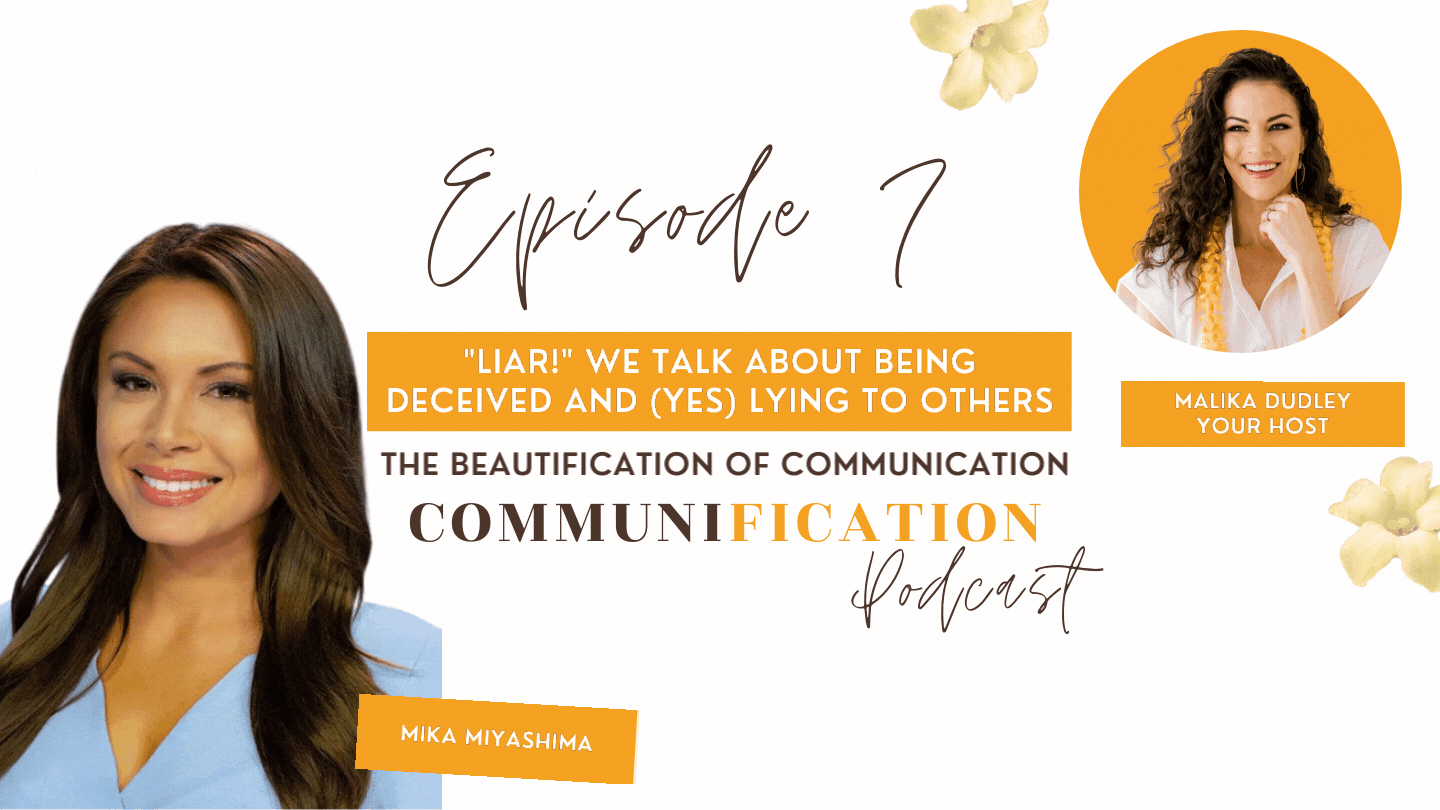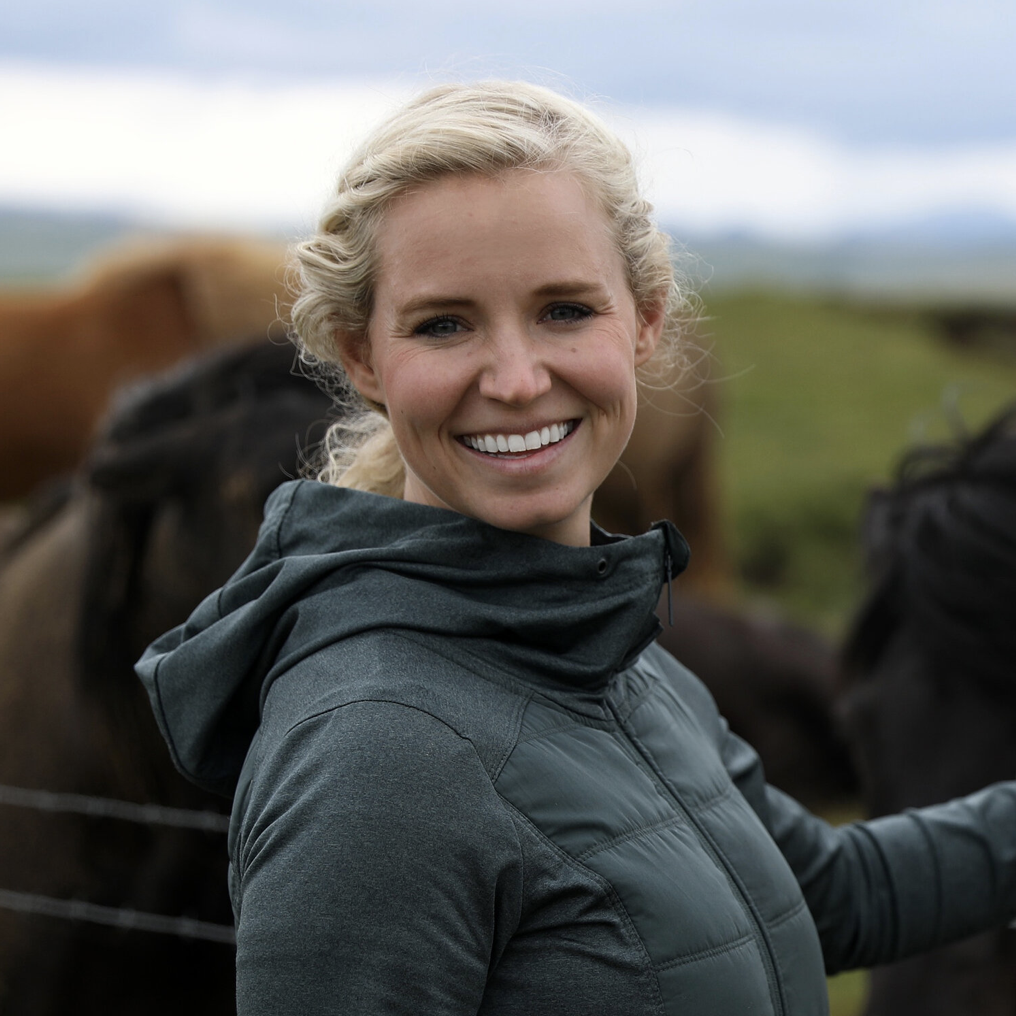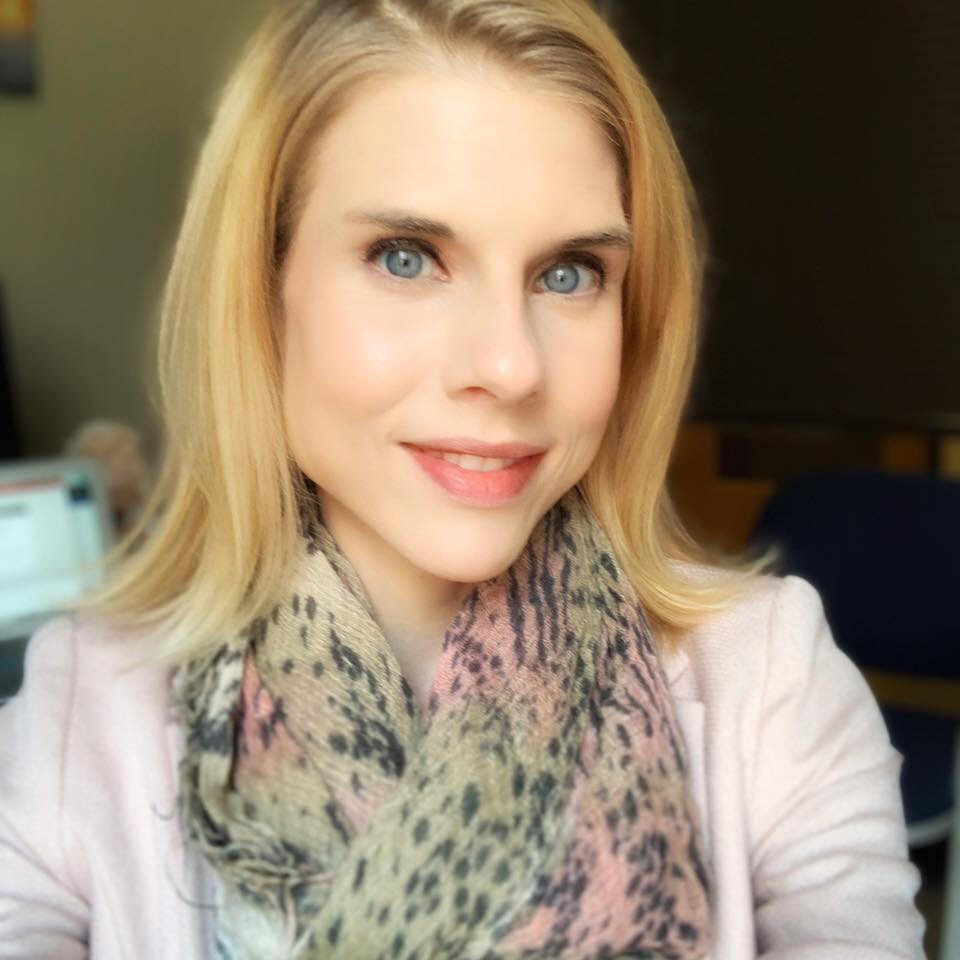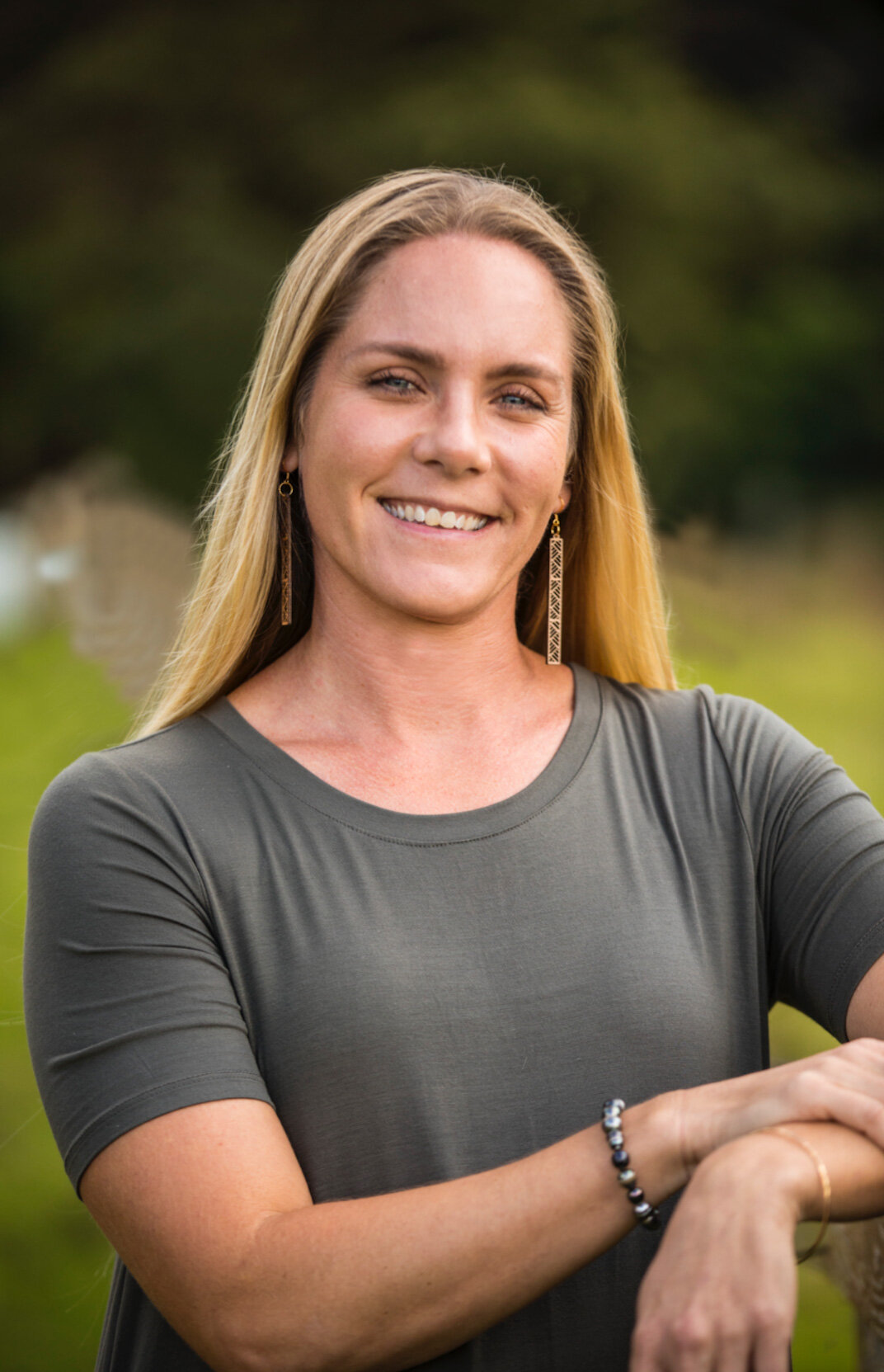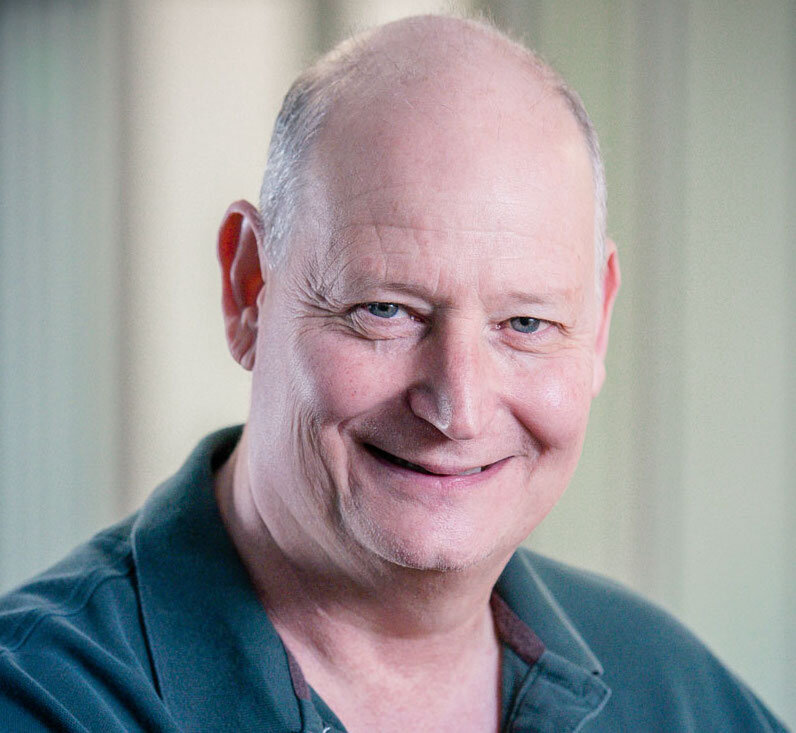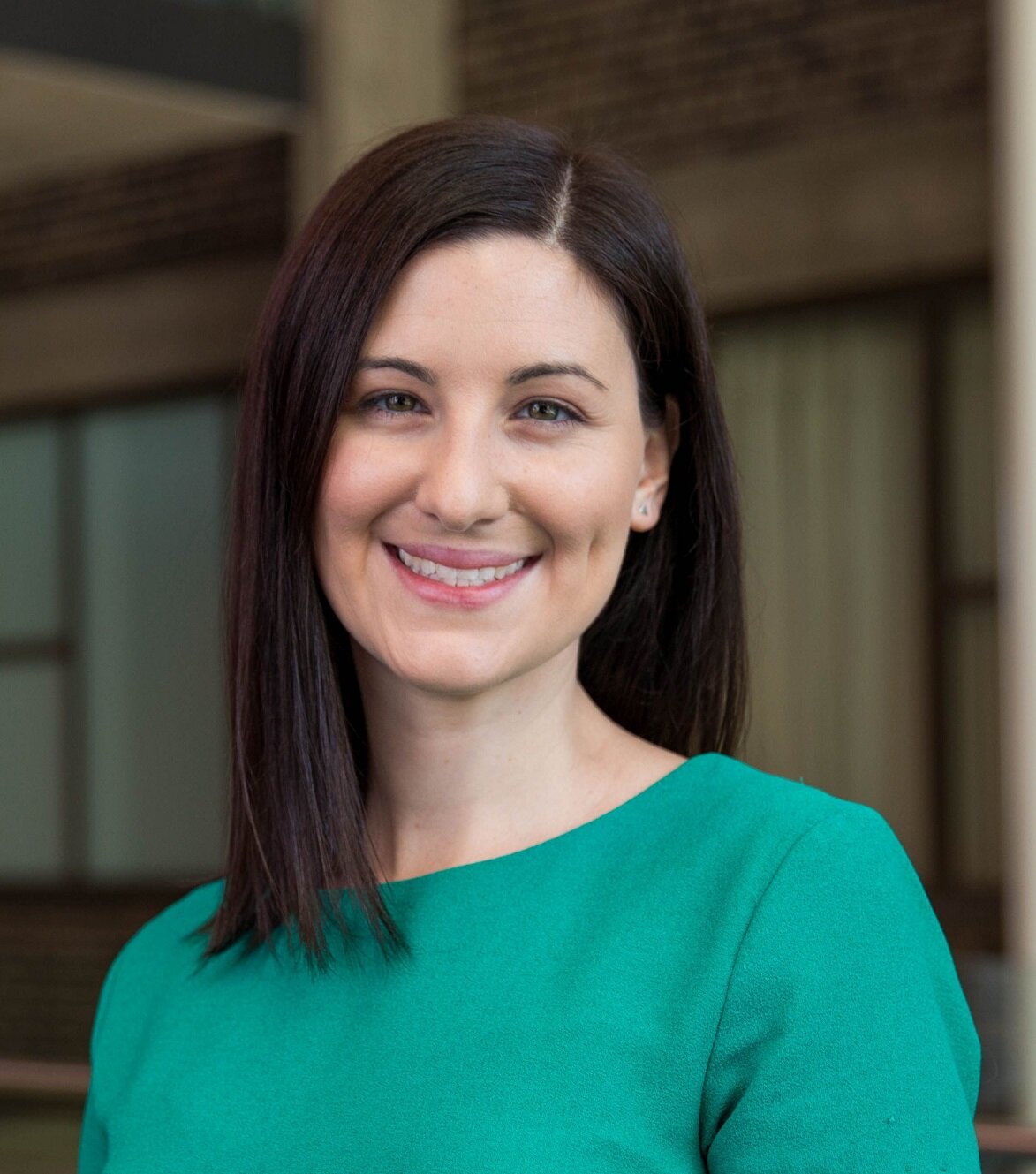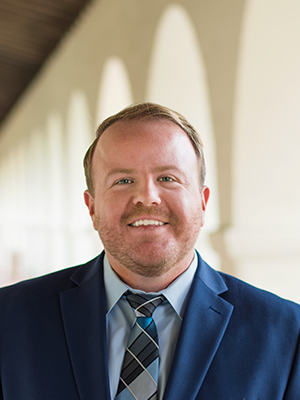Ep. 7: Be a fly on the wall for this discussion about lying; breaking down the research on deception - Mika Miyashima
Below you will find the show notes for “Episode 7” of the Communification Podcast.
Mahalo for listening! Welcome to the ‘ohana!
Mahalo to Society Bikini Hawaii, and Maui Family Magazine for donating to the Maui Humane Society and Project Hawaii Inc..
In this episode we talk about the lessons we learned from Dr. Timothy Levine about deception. He introduced us to the theory he developed - Truth Default Theory - and, shared interesting insights from deception research in the communication field. We learned why people lie, how to best detect lies, and why we are SO BAD at deception detection (especially when we rely on nonverbal cues). Mika and I shared stories about being deceived, and (yes) lying to others.
Main takeaways
We all know prolific liars AND transparent liars… but it’s nice to know that most people are honest most of the time.
When we were younger, we were liars.
Mika shares how she lost trust in an ex-boyfriend after incriminating texts surfaced.
Malika shares a personal story that will hurt your heart.
A discussion about “fake news” from the perspective of two journalists
Time codes
GUEST: Mika Miyashima
[06:46] RE-CAP OF EPISODE 6
[08:24] LYING ON THE RESUME
[08:52] HOW OFTEN WE LIE
[09:52] LYING TO LOVED ONES
[12:32] WE ALL KNOW AT LEAST ONE PROLIFIC LIAR & TRANSPARENT LIAR
[17:14] WHEN THIRD PARTY ACCOUNTS TRIGGERS YOU - AND WHEN THEY DON’T
[19:56] WHEN WE TELL BUTLER LIES AND WHY
[21:22] LISTENER EXPERIENCE FROM ASH ABOUT CHILDREN AND SISTER TELLING BUTLER LIES
[22:43] THINGS WE CAN WORK ON WHEN IT COMES TO BUTLER LIES
[23:29] LYING TO KEEP THE PEACE
[24:25] LYING TO PROTECT OUR PRIVACY & KEEP SECRETS
[26:42] MIKA WAS SENT SCREENSHOTS TRIGGERING HER TO LOOK OUT FOR DECEPTION
[29:14] SOMEONE ACCIDENTALLY TEXTED MALIKA SOMETHING MEAN - BUT SAID IT WASN’T MEANT FOR HER
[36:06] ONLINE DATING STORIES AND LISTENER QUESTION FROM RANA
[41:14] WE DISCUSS BEING CALLED FAKE NEWS
Mika Miyashima bio
Mika Miyashima is the evening anchor of KITV Island News at 6 and 10 p.m. She joined KITV from ABC7 News in Los Angeles, where she worked as a News Assistant helping to produce the traffic reports and overall show production.
Mika was born in Los Angeles, California and raised in Sandy, Utah, where she was a multi-sport athlete and violinist. She earned her Bachelor’s Degree in Communications from the University of Hawaii and interned with the KITV sports team covering basketball and football games. Immediately following graduation, she served as an Assistant Producer for TMZ Sports in Los Angeles, where she found her passion in sharing stories with the community.
Mika is a member of the Asian American Journalist Association. She comes from a family of talented performers; her mother was a professional ballerina who traveled nationwide and her father is a professional actor. They both served as her inspiration in pursuing a career in broadcasting.
In her spare time, Mika enjoys staying active outdoors and has a passion for travel and adventure. Mika has explored at least twenty different countries, including service trips to Peru and India to work with children and the critically ill. These experiences taught her the importance of giving back, and that even the smallest gestures can move mountains.
Watch Mika on KITV4 Evening News
EPISODE 7:
Malika :
Hi, Mika. Welcome to the show!
Mika:
Thank you so much for having me. I'm so excited.
Malika :
We don't get to work together very often, plus I'm remote. So it's so nice to see you! And not just that, but to have a deep conversation about an interesting topic, which I don't think happens enough in our relationships.
Mika:
I know, seriously, total opposite schedules. I was looking forward to this. I don't ever get to just sit and talk with you very often. So this is really nice. I'm so excited and especially in such an interesting topic. So I really appreciate you bringing me on here.
Malika :
Right back at ya. I'm so happy that you took the time. This... what is it? It's a Sunday morning? I don't know. All my days run together.
Mika:
I know same here.
LAYING THE FOUNDATION FOR OUR DISCUSSION - A BRIEFT RE-CAP OF EPISODE 6
Malika :
Before we begin, I guess I'll lay the foundation for our discussion today. So in episode six, world renowned deception researcher, Dr. Timothy Levine, introduced us to a theory that he developed... it's called Truth Default Theory or TDT for short, and there's two sides.
So one, most people are honest most of the time, unless we have a motive to lie. And most people tend to believe others, unless we have a reason not to, or a trigger.
So we walked through all the different types of triggers that have come up in his research. And he was very adamant about the fact that nonverbal cues, your body language, your eye movements, your personality -they're not diagnostic.
So what that means is you can't tell if someone is lying by much more than chance, if you are basing that on non-verbal cues. So I guess to kick it off, was there anything that really stood out to you? What's your initial reaction? Did anything resonate with you and your personal experience?
OOPS! LYING ON THE RESUMÉ
Mika:
It's just really interesting in general, I guess I wasn't super surprised to hear that people are generally trusting until they have a reason not to be. Just because I feel like personally, I want to believe that someone's not lying to me. I generally am a trusting person. And I feel like I'm an honest person as well. I feel like I am not out there trying to just lie to people and deceive people, but it was interesting how he said, I think 75% of people lie like up to one or two times a day.
And that got me thinking like, do I do that? And not even realize it, with the little things. And this is a while back, but I guess I thought about, for a resume, for a job and you fudge a little bit with your qualifications in order to get you somewhere.
And I was like, I totally did that. I'm not going to lie, stepping out of college into my previous jobs. But yeah, it just had me thinking, do I do that on a daily basis?
And I don't even realize it, but overall it didn't surprise me too much just because I do believe, people are inherently good and their intentions are good. And I want to think that I can trust everybody.
HOW OFTEN WE LIE BASED ON THE RESEARCH QUOTED BY DR. TIMOTHY LEVINE
Malika :
Yeah. It's difficult to really have it sink in when you hear that 75% of people lie once or twice a day, because there are prolific liars and there are transparent liars, which push that average up. And so you're right. That inherently, you feel like most people are honest most of the time, because most of the people, so let's talk about the prolific liars - they are the ones that tell upwards of one to two lies.
Most of us will tell zero to one lies. And on our high days when we are big liars, we tell two lies.
Mika:
Okay. Okay. That's good. Thanks for clarifying that.
Malika :
And I thought that was so interesting because you hear that stat and of course, then you start to think of all the people that have deceived you and then you start to go inward and go, oh my gosh. Just like you did... "Wait, maybe I do lie once or twice a day. Maybe I just don't remember…"
Mika:
Exactly.
LYING TO LOVED ONES… ESPECIALLY IN OUR TEENAGE YEARS!
Malika :
What stood out for me was the nuances with deception detection when it comes to family members and loved ones. And, that just made me start thinking because, he talked about how our lives are really intertwined with people who are close to us, but we also, we trust them.
So it's more difficult to lie to a loved one because of that closeness.
And you just know them so well, but then you also trust them.
And so I was thinking about my kids. He said that children begin to learn how to lie or get better at lying between the ages of five and 10. But my kids don't have anything to lie about and I've maybe caught them in a lie, like once in their life, but I know them so well, that I can see right through that, which then made me think of myself as a child or maybe more so like teenage years, high school. Since we are self-disclosing here and you shared about your resumes.
As a teenager, I snuck out of the house a lot. And I would come back in the morning because I was allowed to go surfing in the morning before school. And so I would come back in the morning and I would legit take the hose and wet my hair and change into a bikini and walk into the house.
So mortified that my parents... They know...
Mika:
Or they saw you through the window with the hose.
Malika :
That is possible as well.
Mika:
I can totally relate. Yeah, same time, teenage years, when you're in high school. And I think I had maybe my first boyfriend back then, and I definitely snuck out as well. And said I was doing something totally different, but in reality, I was actually wanting to see him or pretty sure when looking back that my parents probably knew that I was lying as well, but at the time I thought I was totally playing it off cool and sure that they had no idea, but yeah, I definitely had to lie about the same type of thing. I'm not super proud of that, but yeah, I can relate.
Malika :
It's a part of learning and growing, but it's still uncomfortable. Like I do not bring it up with my parents. They have told me, or I guess maybe they've talked to my siblings about it. So my siblings have told me, "oh, mom and dad know about that," but I cannot have a conversation with them about it.
Mika:
It's in the past.
Malika :
That's right. Let's just move forward.
Okay. We were just talking about prolific liars and transparent liars. So I was wondering maybe if you have a story of someone that, you know, most of us land in the middle, but we all know one, either a prolific liar or a transparent liar. Do you have a story to share?
WELL ALL KNOW AT LEAST ONE! PROLIFIC LIARS AND TRANSPARENT LIARS…
Mika:
Yeah. First I, okay. I do know both and it's so funny my friend is like the sweetest person in the world. She is just an actual angel on earth, but she is the worst liar. Like she cannot tell a lie and it's just you wouldn't even be able to tell, but then she just gets all nervous and she' s like "okay, I got to tell the truth. I just can't," she physically cannot tell a lie, which I really appreciate. I think that's a good thing, even though maybe it comes to her disadvantage sometimes, but it's just so funny because she literally cannot tell a lie.
And then, I do know people that I've noticed, it's not necessarily lying to me, but I've seen that they have deceived someone else at least once a day.
And I noticed that and then it makes me think, okay, are you telling me the truth every time I talk to you? Or are you, what are you lying to me about? If I see you saying something to someone else and then talking smack behind their back or what you just said to them, I know isn't true.
So that kind of thing I do have people that I know like that, that I see on a daily basis with some type of deception in one form or another.
Malika :
So you've been triggered because, like it's the fact checking, that this person has lied in the past and does it on a regular basis. And so that's one of the things that he said to look out for, a trigger, which doesn't mean that you should automatically assume the person is lying to you, but collect the data.
And especially if it's something big, that's when it matters. That was one of my biggest takeaways was like, does it matter?
Mika:
Is it worth, worrying about or thinking about exactly. Yeah. That was interesting. What you two were talking about.
Malika :
I actually, I know a prolific liar, so there's an individual who once covered for me for a gig.
And it was this big interview with a like mega celebrity. At the time she had just won an Oscar. I couldn't make it, but I still wanted to get that footage. So I posted on my personal Facebook page asking if any of my media friends wanted to sub in for me. And this was the person that reached out and I didn't know them very well, but I did some social sleuthing.
And, there were photos of this person doing what looked like interviews with celebrities. And we also had a ton of mutual friends in the industry. So again, truth default, right? I just, I trusted it and I set it up. And it didn't end up working out very well. I guess this person actually had a reputation for being a liar and I had no idea, but the press person actually knew about it, which is so interesting because they were from the continent, I live here, but basically that person was like "Nope."
But that's not the end of the story. So then a year goes by and I'm at the same event that happens every single year. And I happened to look online and this person had posted on Instagram, my media pass from the year before with a pencil strategically placed over my name and basically saying how excited they were to cover this event again this year. Mind you, I'm literally sitting at the event and it's super exclusive, but again, truth default, I'm looking around. I'm like, where is this person?
Mika:
Doesn't match up right with what they're saying?
Malika :
Yeah, so they weren't there. So now I'm triggered and that's when I start asking my friends. And I'm like, and that's when I actually started to find out that this person had a reputation for not telling the truth.
But then it's not over. So now the next year I'm at an interview and this person posts that they dressed one of the celebrities I'm about to interview. So I'm like, oh, I'm going to do a little fact-checking.
So I legit asked this person in the interview "who dressed you" - and you guessed it. It was not this person. So they do exist.
Pathological liars do exist, but they are few and far between. And if I really had dug around because of technology, I probably could have found evidence.
There are literal lawsuits against this person, so that was definitely my bad for not doing my homework. But then again, it's human nature.
Mika:
Exactly. That type of thing you wouldn't necessarily think that you would need to do your research on that kind of thing. Are they lying about this? If someone posts something like that, you would just assume that it's true. They design the dress or... so, that's wow. That's extreme.
Malika :
Yeah. So there are a few pathological liars, there are a few transparent liars and that impacts the research results if you don't account for those people.
But again, just a reminder to everyone and to ourselves, most people are honest most of the time, most people believe others most of the time and it doesn't have to be a bad thing. And it's really good to know, what steps you can take to detect lies should you be triggered.
Mika:
Yeah. Yeah. You guys talked about really interesting points with even the third-party warnings or like you were saying, word of mouth. Sometimes people do know others have a reputation and when you trust someone and you hear that, it really makes you step back. That is a trigger. Okay. Maybe I need to do my research or maybe this person isn't all that they're saying they are so that was an interesting point that you were talking about too.
WHEN THIRD PARTY ACCOUNTS TRIGGER YOU, AND WHEN THEY DON’T
Malika :
With the one caveat though, of the close relationships. And he gave the example of we've all had that friend with some douche person, and you're trying to tell them this person is not good for you and they just won't see it.
Mika:
Yeah. And sometimes they just have to learn for themselves. You look out for your friends and you warn them, but I think you were mentioning earlier that they're not trying to end their relationship, or they're not, they're just trying to be happy and they don't want to believe that it's bad. And so I understand that, but yeah, sometimes you just turn a blind eye towards that type of thing. Just cause you don't want to believe it, but it definitely exists.
Malika :
Oh, totally. That made me think of when the study that he did, that he said wasn't published with the senior citizens and the younger people. And so it would be really interesting. I hope that someone does this research in the future. Maybe they have already, but you get into different types of relationships and maybe even breaking it down even further to 30 and 40 year olds, women and men, because I would assume this is just, again, this is like personal experience, personal thoughts, not based in research, but that's what this podcast is about.
It's just, we get to talk our thoughts out, I'm trying to think if I'm almost 40, and if I was single right now, I might not want to believe someone telling me that my partner is deceiving me because I'm... I need... I got to make kids right now. I gotta get married.
Mika:
Yeah, you don't have all the time that you do when you're in college and you, maybe you don't have a little more time to plan this out and think about who you want to spend the rest of your life with. Totally. And that's a really interesting point too. I guess when you're younger, you have that time. Not saying you're not young, you are young, but when you're in college days or high school, it's important to know that kind of stuff. Cause you still have the time to go and shop around, go date someone else maybe, spare yourself from heartbreak or whatever these things are that someone could possibly deceive you, but when you're older, you don't have that kind of luxury of time and there's kids involved. And so I don't want to know about it. Just have someone there to support me.
Malika :
It might be generational too. Now that you say that, I'm trying to think that our generation might be more willing to not turn a blind eye because divorce is normative, but our parents' generation not as much.
Mika:
Yeah, exactly. I think so, too.
WHEN WE TELL BUTLER LIES AND WHEN
Malika :
All right. We're just thinking things out right now. Why don't we move into Butler lies. Okay. I love this name, Butler lies. He called them avoidance lies. I was trying to think about them. And I'm like, when was the last time I told the Butler lie and I started to feel sad about my life because I don't have a reason to tell a butler lies because I'm home all the time. Why am I gonna lie to you?
Mika:
Butler lies. It was so funny because I'm totally guilty of this. Sometimes you guys were mentioning, checking your phone. Oh, sorry. I just saw this. I just saw this text. I'm totally guilty of that. Sometimes I do glance down, but I don't have the time to respond back right away or I get busy and I forget, and I have said sorry, I just saw this, but technically that's a Butler lie.
I realized, and I need to be better about that, but just getting distracted, I realized little things like that, I'm totally guilty of that.
Malika :
Now that you say that I do, I have done that recently - because what's good about those little lies is that they are actually good for our relationships.
So it was nice to hear from Dr. Levine that it's okay. If it's going to help to socially smooth the relationship out, then relationally, what's the goal? Instead of saying, "oh, I saw your text and I just didn't want to respond at the time and now I'm finally getting to it. Hey, what's up," so I did have a listener who wanted to share their experience. So why don't we take a listen to Ash?
LISTENER EXPERIENCE FROM ASH ABOUT SISTER AND CHILDREN TELLING BUTLER LIES
Ash:
Hi Mika and Malika, thanks for having me on the podcast. So one of the little lies that my kids like to say a couple times a week is they're always telling me that they're already ready. And when I do go there to pick them up to take them somewhere, they're still not ready.
They're getting out of the shower, they're brushing their teeth, they're still trying to find their outfit. So that's one of the little lies I hear every week. And there's another one that I tend to always get from like my sister them they're like, oh, I'm right around the corner. When I know that she's still on Instagram and she's posting away because she hasn't left her house yet. But thank you so much again and take care. Bye.
Mika:
Oh, my gosh. That's so relatable.
I am her sister. I'm just outing myself right now. Yeah. I totally do the same thing and I don't know why I do it.
But it's something that I really need to work on is not with work situations, but on the weekends or something, when I'm going to hang out with a friend, I'm always saying I'm on my way, but I haven't even left the house yet.
And then I think, why did I even text that? I should've just waited until I was actually in the car, because I'm not actually on my way yet. And so that's something I totally need to work on, but I can definitely relate. I don't know why I do it. There's no reason.
THINGS WE CAN WORK ON WHEN IT COMES TO BUTLER LIES
Malika :
I love that you differentiated between the different types of Butler lies because the one that's like social smoothing, that kind of makes sense. We're just trying not to start an argument. We're trying not to make the other person feel bad, but then when it comes to the, "where you are" lies... Is there really a reason behind it, so that actually, you're right. That could be something that we can all work on is doing less of those location specific Butler lies, because maybe you should just say you're still at your house.
Mika:
Yeah. And I'm really going to try and do that next time.
Malika :
Yeah, me too. So I like that you differentiated between the two of those. And I think that could be something helpful for all of us to just be like, yeah, we can tell the truth about where we are.
LYING TO KEEP THE PEACE
Mika:
I know something so simple. Yeah. And another thing with social smoothing. I think another example of when I realized I do this sometimes just to try and keep the peace or first of all, with relationships, with my boyfriend, even though I might feel some type of way, or I'm not over the argument, I'll say, okay, moving past it. And technically, I guess that's a lie, but it's just not worth even dwelling on it.
But also with situations with my family or there's stresses at work. I don't necessarily always just vent to them about everything just because I don't want to stress them out or worry them. So even just something as simple as I'm asking, like, how are you doing everything good? And I'm like, yes, everything's great.
But I think we can all relate to this. Maybe not everything is totally completely great, but it's just, you don't want to have them worrying about you or save them the stress. So I realized that's something else I do, technically I'm telling a lie like that.
LYING TO PROTECT OUR PRIVACY AND KEEP SECRETS
Malika :
Oh. So many people can relate to that. I can relate to that for sure. Yeah. It makes sense. And along those same lines, I was thinking privacy- wise. Cause he was saying it's okay to lie to protect your privacy, which felt really good coming from a researcher, because I feel, especially for people like us that are in the public eye, there could be very real safety issues for certain types of things that we might not want other people to know.
And he was saying deception is lying with some kind of intentionality or function to it. So clearly if we lie about what, where we live, our address, there's a functionality to that. That is deceptive based on the definition of deception, but it's necessary. And it's okay. It's okay to lie in those instances.
And that made me think of keeping secrets for others that I've had two of my best friends tell me very big secrets. Huge secrets. Never told anyone, nobody, these two specific secrets. And so it does put you in a position where at times, it's not very often, but at times I have to protect that secret.
And so I might have to tell a lie or omit something, or just be vague, they call that equivocation, in order to protect my relationship and the secret itself doesn't hurt anybody else. It's just very personal to these two friends, two totally separate secrets, but I think that even if any person that I did not tell about it, that if they were to find out in the future, that I had lied about this one thing and what it was that they would probably respect that and understand why. I had to not tell the complete truth or tell an untruth, and I don't consider myself a liar or a deceptive person because I've done those things. And so it's really nice to hear from the researchers that sometimes lying is a good thing when it comes to our communication and our relationships.
Mika:
Yeah. And I can totally relate to that as well with secret keeping and best friends sometimes there's things that you just, you can't tell other people.
And in order to keep that a secret, you do have to tell a lie, but it does make me feel better that Dr. Levine said that's okay in certain situations. Cause I can definitely relate to that.
MIKA WAS SENT SCREENSHOTS TRIGGERING HER TO LOOK OUT FOR DECEPTION AND ERODING THE TRUST
Malika :
All right. We're going to shift into something that's already making my heart beat. My heart rate is quickening. So the question is, have you ever caught someone in a lie and we're talking specifically about deception and technology. So this tends to happen over text message. I would say, because it is like fat thumbs or whatever it is, or you just everyone's done it. You mean to send it to this person, but it goes to a group with that person in it, or it goes to another person that has the same three first letters to their names. Do you have a story to tell before I tell mine?
Mika:
I just have, this is a little personal, it's not the exact same thing, but definitely technology has played into it... In the age of screenshots and voice recording. With an ex-boyfriend this is back before college days.
That was the first time I had ever had a relationship where I actually caught them lying about something because someone else had sent me screenshots of something else they had sent them at the same time and what they were telling me wasn't true.
And that was the first and only time I've really dealt with that kind of drama over technology and text messages and screenshot. And someone actually DM'd it to me on Instagram. But after that, I had my guard up for awhile and I was like, oh my gosh, I guess I can't trust everything that this person says or does. That's the first thing that comes to mind.
Malika :
Wow. And he was saying that is the best way to detect deception, right? Is to have those receipts and someone is literally sending you the evidence. So there you go trigger up and now you've lost trust.
Mika:
Yeah, and it's pretty hard to gain back, once you've lost that, it's now I really have to question and bottom line, that relationship didn't end up working out just because the trust wasn't there. So that was what kicked it off.
SOMEONE ACCIDENTALLY TEXTED ME SOMETHING MEAN BUT SAID IT WASN’T MEANT FOR ME - TRIGGERING!
Malika :
Thank you for sharing that intimate story. Okay. Okay.
So honestly I struggled with whether to tell this story or not.
And I talked it out with my husband, but ultimately I feel like it will do more good than harm for others to know that they are not alone.
So if you've experienced something similar, my heart definitely goes out to you. And if the person that this story is about does listen to this podcast, I hope it might lead to more understanding of my perspective and maybe some steps that they might take to make things right. Okay. I'm literally shaking.
Okay. So I had this one time where someone had been avoiding me and I was trying to figure out like what was going on, literally went from like the nicest, most amazing friendly text messages to abrupt answers and clearly something was going on. So I would send a nice text message every now and then, or I would ask a question every now and then over text to just, I guess I was trying to just figure out what was happening.
And so I had asked for details about lessons for the kids. And I knew that this person took their kids to this one spot and it always took before, before whatever it was that happened, which I still don't know exactly what happened to make everything go so wrong. But before they would reply right away.
And this one took two hours, which was pretty typical after things started to go downhill. And the person suggested a place that was like clear across town and it was not the place that the kids went to. So then I asked about the specific place that they went to and if they were any good and the text message I got back was, "yes, they're good."
And then a few seconds later, the text that comes through is, " She knows we go there. Why she got to play games!!?? Lunatic."
And then a couple more texts right away. Like maybe after a couple of minutes saying, "oh, that text was meant for someone else." And I, I was just in shock and I still had no idea why I was being treated the way I was prior to this text situation and the person called to apologize and explained like this whole lengthy story about who it was meant for and why they said what they did.
And I didn't answer to the phone call clearly because I just knew that I wasn't in a space to like, receive anything at that moment. But on reflecting on the situation, I thought about how Dr. Levine said that research indicates that lies are actually more coherent than truths because you feel like you have to create a story that fits the narrative.
And the other thing is that if you have a text chain with this person who the text message was meant for, it's pretty easy, like they did for you, to screenshot that as evidence that the text wasn't meant for me send that over to me, but that never happened either.
So I suppose I could have asked for it, but again, in line with research, I believe people. But the weird shift in communication, the avoidance that was happening, that was definitely a trigger to be on alert for deception when that happened.
And I did actually attempt to fact check, Ugh, this was in my, I want to be brave yet kind period. I'm still in that period, but I reached out to someone that I thought might be involved and this person really didn't know anything about the whole situation.
And it was so uncomfortable for me to approach someone and try to... cause they didn't want to throw that other person under the bus. So it was really cryptic. I'm just like, is there an issue with me, can you help me to understand? And she's oh my gosh. I was really proud of myself, for being brave enough to like have an adult conversation with someone and allow this other person to voice their grievances if they had any. But she didn't have anything to say. And it was just super awkward and I probably should have done that with the person in question, but I just, and I ended up apologizing to the other person.
I'm like, I'm sorry that I brought you into this because you had nothing to do with the situation.
I was just trying to fact check, like I was just trying to gain, gain some kind of, honestly I was trying to find evidence for the opposite. I want this to not be true. I want to believe that was not meant for me, and I don't want to bad mouth anybody.
Mika:
Yeah, of course not, of course not. But in that kind of situation, it's like, all right, you just have to go with your intuition. It sounds from the conversation and you can recognize signs of when someone is, changes their attitude or feel some type of way towards you.
I think that's something that you can just tell and sense. Yeah. And in those situations, you just want to know if I did something wrong, just tell me, I'd rather just know and move on rather than just guessing. And yeah. So I'm sorry that happened to you. That's a tough situation.
Malika :
Just like you were saying, my, my husband and I had one friend who knew about the whole story and both of them were like, oh, that person's totally lying. I don't really understand why you don't fully buy it yet, but Dr. Levine was saying, don't assume bad. So honestly, I'm still on the fence about whether to believe the person or not.
I would love for them to clear the air by showing me the receipts. Or come clean, that would not be comfortable, but come clean. Let me know that you were lying in order to not hurt my feelings. Because that's what we're also learning about is that we lie in order to social smooth.
And so I can totally understand that my husband, at this point, my husband's we don't need them, and I definitely have boundaries. And they are up, for sure, but I'm also a very forgiving person. If that means like you're actively in my life or not, I feel like I can forgive you. And even if it means that you have to be loved from afar, or you've deceived or hurt me. Not going to lie, it still hurts.
Mika:
Oh, I'm sorry. From what you, from what, from the story that I heard it, it does sound like there are definitely lying, and I would feel the same way that you're feeling. And like I said, it's just better to clear the air and I'm the same way as you, I'm pretty forgiving.
I respect, if someone will just come out and tell me, or let's just talk about it face to face over the phone, whatever the issue is, let's just work it out. Doesn't mean we have to stay friends or whatever, where you can totally still cut ties, but I it's always better to have that closure rather than just that kind of weighing over you.
What did I do wrong? Or what did they mean by that? Or they should come out and apologize. Just think at some point we're adults and it's just better to just squash it by being honest.
Malika :
We are getting into a whole different topic here, which now I do have an episode on apologizing though.
So if you want to listen to episodes two and three, but gosh, conflict management. I think that's definitely on the docket for future episodes to get into that. Okay. Let's lighten things up a little bit. I don't know. She might not think it's light, but I have another listener question and also story. And this one is about online dating and deception. You ready?
Mika:
Yes. So ready.
LISTENER STORY ABOUT ONLINE DATING AND QUESTION FROM RANA
Rana:
This is Rana, thank you so much for having me on your podcast. I understand you wanted to know about my experiences with online dating as it pertains to deception in the digital world. In my experience, I find that deception is actually common with online dating.
I don't mean like deception from scam artists. I know that happens, but I'm just talking about slight misrepresentations and exaggerations, especially when you look at the biographies for any prospective date. I understand that guys and I'm sure women do this as well. Tend to misrepresent maybe their physical appearances, maybe their interests or their personal qualities in order to get a first date with someone.
But by doing that, there's deception involved, which I would think eventually leads to mistrust and therefore no chance for a second or additional dates.
So for example, I found that the biography photos of potential dates that are posted online tend to be 10 or more years previous. So you don't actually get to see what that person looks like currently.
In my experience, I have been deceived by a person's age and his bio picture. So he listed his age as 47 years old and his picture looked like he could be 47 or maybe at that time he was 47. But upon meeting him, I had a hunch that something was up because he looked older than his picture. He did finally confess that his true age was 62.
There was another time when I was deceived by a person's listed height. And of course in bio pictures, you can't really tell the person's height. Anyways, he listed himself as five seven. And by looking at his photo, I accepted that. When I met him, I told myself there was no way this guy was five foot seven.
I'm looking at him eye to eye and I'm five foot three. So in both cases, I didn't go on a second date because I felt I was deceived and yeah, I was deceived. So here's my question with online dating. If deception is used to get a first date, why would that person think he or she would get a second or additional dates because eventually that person's date would figure out or detect the deception wouldn't you think?
In any case, continue your awesome work. And thank you again for allowing me to share my experiences on your podcast. Have a good day Aloha.
Malika :
Oh, thank you so much. Gosh, this one's very common. I don't know. I'm not on online dating, I haven't done any of that…
Mika:
I totally have way way back when.
Malika :
Oh, you have?
Mika:
A long time ago. A long time ago. So I can totally relate to what she's saying this is like maybe 10 years ago or so, but yeah, she, I totally can relate to that because people definitely fudge, with the age thing or the height thing, that exact same thing has happened to me, but there's no way of even knowing until you meet them in person.
And so they lure you in and then, which I don't do online dating at all anymore, but I went on probably two dates. It just was not, neither of them went well. And so I was just forever scared of that ever again. So because of that exact same thing.
Malika :
Yeah. When you deceive a consequence of that is that it erodes trust.
So these examples really don't make any sense to me because you can understand the weight thing. We talked about that with Dr. Levine. It's pretty normalized that on our driver's license or on our online dating profiles, we might, for women, for example, we might doc off five pounds, but weight also changes, like I could actually be five pounds lighter or I could gain five pounds like that is in the realm of possibility and reality.
But height and age? You can't make yourself taller or younger. So why would you lie about that?
Mika:
I think I know. And to answer her question, I think that it's about some people maybe, especially for guys, like they think, oh my gosh, if I put my actual age or if I put my actual picture of what I look like right now, no one's going to want to go on a date with me.
If I just get that one shot, he probably really want him to get that date with her and just figured if I just fudge it a little bit, get them in, they'll meet the in person then they'll, get to know me. And maybe it won't matter that I shaved off 20 years.
Shorter what I said three or four, but yeah, I think it's all about just getting to the point of that first. That's the motive, right? For deception, is they want to get that first date and then just see, all right. If I can go from there, hopefully get them in person and see where it goes. But that's not fair to the other person who thought they, they look or they are a certain age and then they see them in person. It's just totally different.
Malika :
Totally. She was triggered right away. She doesn't know very much about these men and then they show up and immediately it's "oh, you lied to me."
Mika:
Yeah. The first impression is okay that's not a good thing to start the relationship... deception all of that. So it's smarter for her to not to do second dates.
TWO JOURNALISTS DISCUSS BEING LUMPED IN WITH NATIONAL NEWS AND CALLED “FAKE NEWS”
Malika :
All right. Let's shift gears again. Deception is such a wide ... we're spreading this wide net.
Okay. But I've chose you for a reason for this particular topic, because it's really big right now. It's a topic of discussion. It has been for a few years now actually, this whole concept of fake news. So I thought since we're both journalists and we both work in the media, that this would be a good topic to tackle and unpack.
So how do you feel about being called fake news?
Mika:
Oh gosh. Yeah. This is such a, this is a tough I'm glad that you asked that because it is hard.
We work really hard in the news industry and media at KITV, all the stations here. We all work really hard and just for that to be undermined. And it's tough to see that every day from people.
And I think that people don't really realize or distinguish local news versus national news. We are the ones who are going out in the community. We're getting into, we're talking to people, we're covering the monk seal being born on the beach to city council hearings. We're the local news. So we're not lying when we say that someone had gotten in a car accident on the H3, or that I'm not sure where people think that it's false information.
So I think it's just people don't really make that distinguishment between national and local news. And it is hard, especially with just so much tension, obviously online, social media. I know there's a lot of mistrust, so it is hard to see that. And I think that all media just get lumped into one category of fake news and it, and sometimes people can't exactly prove why they're saying that, but it just gets directed at us.
So it's hard. It's definitely hard, especially right now.
Malika :
And the other thing is they can't necessarily prove it, but you can always prove whatever point you want to make, because there's always something online that can bolster whatever your belief is. And so I actually wrote down that same exact line that you just said, that we get lumped all into one category of liars.
And so the people that believe that everyone in media is fake news, they've been triggered. And so they most likely, very genuinely feel like the media is trying to dupe them. And they probably have those third party sources confirming their thoughts and some media outlets do lie, or they omit, or they tell untruths so we can understand why someone might feel that way.
I would just hope that. Anyone that does feel that way would assess each media outlet, each media personality, really for their own merits. And like you were saying, it's so small town, this is a small network. If you wanted to find out if one of us was lying to you, you could find out it's not that difficult.
Mika:
Exactly.
Malika :
But we're held to journalistic ethical standards. Like we are very real people that live in these local communities and why would we throw away our reputation or our careers or our relationships, to deceive our viewers, we are the messengers of information.
Mika:
Exactly. And like you said, we live here, we have family here.
We care about the community and there's absolutely no reason for us to be lying or deceiving, like you said. And also, on social media, there's just a lot of information and a lot of misinformation, and there's been, a lot of controversy lately. I just want people to realize that there is always two sides to the story.
You can't always believe exactly what you in one post, you can't just see that or read that and believe that narrative, I would just encourage everyone to always question what the other side is. And maybe there's some things that aren't being told or that aren't true in that certain post whatever it is.
And just like you said, fact-check, that's a very important way to see if someone is being deceiving or not. Yeah, and same with us. We have to do that every single day as well, because always question, what you're told or what someone says and fact check and make sure that it's accurate.
Malika :
This was actually a point that was brought up. It's not an episode that's out yet. Or if you're listening to this many months in the future, it might be out, but it was about cyber-bullying. And one of the major research-based strategies that they were giving is to do an editorial review, to fact check, or to have someone read what it is that you're posting and see, can you go deeper?
Can you critically think about what it is that you're posting this content that you want to post and just make sure that... 'cause you can fact check yourself too. We're talking about fact checking other people, but we can fact check ourselves, which is what we do in our newsrooms.
Mika:
And on that topic, I recently did have someone close to me, deceive me and not just me, but a whole group of people and the consequences were big.
And it's been a pretty, it's been a big factor in my life lately. And so ultimately I had to just cut them out of my life because some things aren't worth trying to repair or it's just too big of an impact to even ever forgive. So yeah.
Malika :
That's so hard. It's so hard. Yeah. And then when you add in that layer of tech it makes it even harder because of the affordances of computer mediated technology that it's persistent.
It just stays there forever.
Mika:
There's no getting rid of it.
Malika :
I recently just saw a meme and it said "it's scary when the weatherman is the closest one to telling the truth on the news." And gosh, there's so many layers to that. I probably can't adequately dismantle it, but... you wouldn't believe how many people when, okay.
No, I'm making it sound bigger than it is, but I have definitely had people say that it's a "crying wolf storm," or it's a "fake storm" when a hurricane doesn't hit us. And to me that like verges on cyber bullying. I'm just the messenger. And I am like literally putting 150% into trying to inform people as accurately as I can.
It's weather, you did weather, it's weather it changes.
Mika:
It changes constantly. Exactly.
Malika :
That is understood. It should be understood that the hurricane might not hit us. And if it doesn't, it's not a fake storm, it's a lucky break.
Mika:
Exactly. And your job is to inform people, obviously hope for the best, but we have to warn people, prepare for the worst. Exactly. And that's our job. That's your job being a meteorologist. So people are prepared in case, it actually, a natural disaster happened. And that's good that you put it out there, that the weather does constantly change. Cause that's something that's out of your control.
Malika :
And I think people don't really understand that the weather people, the meteorologist that you see on TV, we have to go by what the national weather service says.
We are not the ones that are issuing the flood alert or the hurricane alert. Like we're not the ones waving the flag. We are going, oh, the flag is up. I need to tell you about the flag. I don't know when you think about it that way too. And it's been interesting to figure out how to reply to someone that says fake storm or crying wolf storm. And so I think recently someone said that about what was it? Linda? Can't remember who the last one was. Yeah. Linda. And so I commented back and I try to just, be humorous and just be myself be true to my values, which is okay, I'm going to let go of the fact that this person is being unkind and I want to respond as my best self.
So I think I put " ha, ha, mother nature giving us that fake news again," or responding with kindness or just not responding at all. It's actually a really good way to go.
Mika:
Yeah. That's what I do whenever I get people on social media, honestly, sometimes it's just not even worth responding to. I try to, but like you said, it's, it does come with the job.
You're going to have people who are criticizing, or don't fully understand how it works, but yeah, sometimes it's better to let that go. And it's hard sometimes.
“FUNNY” LISTENER STORY ABOUT DECEPTION
Malika :
I thought we would end on a funny story. So I have an anonymous listener who shared this story with me. Okay.
So she says, "The neurosurgeon I was seriously dating called in the afternoon to cancel our evening date because he got pulled into an emergency surgery at Kaiser, but then, he pocket dialed me from his boat while he was trying to get some chick drunk and naked. I heard everything I needed to hear. I like to imagine that Steve Jobs was watching from heaven. He had recently passed and was playing a game called who needs to be butt-dialed today."
Mika:
That doesn't sound like surgery. Okay.
Malika :
At least she got, I feel good for her, but like she got to get out of there. Thank you for telling me who you are. Steve jobs.
Mika:
Yeah. Better that she knows now, sooner than later down the road, when she's already had her time wasted and yeah. Oh gosh. That's all bad.
RE-CAP OF DR. LEVINE’S RESEARCH-BASED STRATEGIES FOR DECEPTION DETECTION
Malika :
Oh to button up our time here, the research- based strategies that were shared by Dr. Levine were that the best way to detect deception is to fact check, then assess plausibility. Does it sound reasonable and finally ask yourself, does it matter? Because if it doesn't. Who cares?
Mika:
Let it go. Just let it go.
Malika :
Is there anything that you'd like to say to round out our discussion?
Mika:
No. You know what? I don't think so, but I just thank you so much for having me on again. I appreciated being able to come on, share my thoughts and also for learning so much, I really felt like I learned so much in, in your talk with Dr. Levine and it was really interesting and I could apply it to my own life and it made me take a step back and realize, there are things I can change and work on, or it was just, it was eye-opening and very interesting. So I appreciate you and your podcast and thank you so much. And it was so nice catching up with you too.
Malika :
Right back at you. And I'm so happy to hear that because my "thesis baby," that was the whole point of it. And I'm so happy to be on this journey with my friends, where I get to invite them on and we can learn together. And so I'm so happy that it resonated with you in that way... I'm going to cry. It's just so it's so nice to have friends that you can have deep conversations with and it just flows.
And I just love you. Thank you so much, Mika.
Mika:
Thank you so much for having me on and for giving me a chance to talk about these things that I haven't been able to talk about, so I appreciate it. Thank you.
References
Please view the show notes for Episode 6 for academic references mentioned in this episode.
Giveaway Details
This is one of the marketing strategies we are using to give the podcast that extra little push.
Any participation is GREATLY appreciated!
Here is a list of the giveaway items that I have already secured:
Olukai footwear x 2 ($100 value each)
Maui Divers pearl and diamond pendant ($695 value)
Noho Home luxury quilt ($200 value)
Aloha Modern luxury towels
Goli Gummy 6 month supply of vitamin gummies
Lehualani jewelry
Chef Sheldon Simeon’s Cook Real Hawai’i cookbook
Primally Pure mist, serum, and mask
Cameron Brooks photography prints x 5
Oneloa Maui hat, clutches
$100 Amazon gift cards x 4
5 Proact Products Hawaii small solar lights
Samia Surfs Children Book
Tidepool love hair picks
Radar Girls by USA Bestselling author Sara Ackerman
Goodwill Hawaii $100 gift certificate
Each of these actions counts as one entry:
Follow @communificationpodcast on Instagram
Follow @malikaspodcast on Twitter
Follow @communificationpodcast on Facebook
Share the @communificationpodcast on any social channel (tag me @malikadudley so that I can count your entry)
Sign up for my newsletter (you can do that in the sidebar here on this web page, on the home, or about pages)
Leave a comment on the YouTube channel podcast episodes.
For FIVE entries: Write a review for the podcast – share it on social media and tag me so that I see it
**This giveaway is open to anyone in the United States. Winners will be randomly selected and announced on the last day of each calendar month. Details on number of winners, and who has won will be announced on @communificationpodcast social media channels. We will allow one week for a response, after which time a new winner will be selected. This giveaway is in no way associated with any of the social media channels mentioned above. No purchase necessary, void where prohibited. By entering, entrants confirm they are 18+ years of age, and release any of the social media channels mentioned above from any and all responsibility.**
Current and future episodes of the Communification Podcast
Click below to see the show notes & listen in.
The episodes that have yet to drop are COMING SOON!


